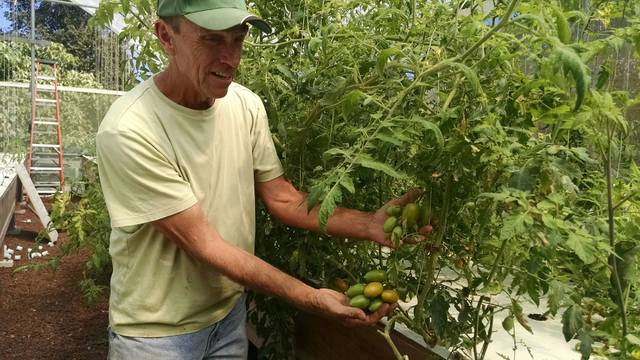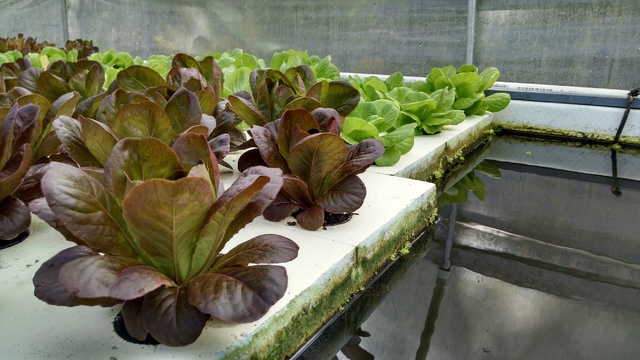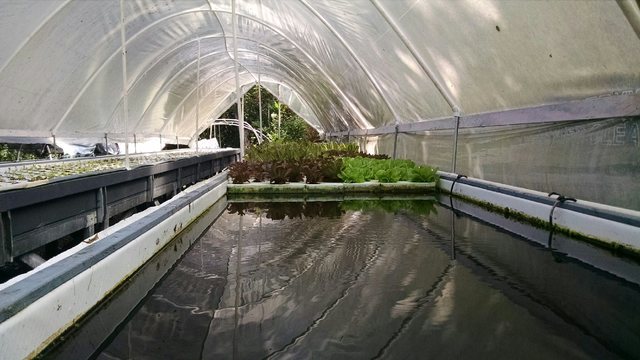Three years ago, Stan Lyons, owner of Malamalama Farm in Honaunau, looked over his devastated coffee crop, lost to the cherry borer beetle, and asked himself, “What’s next? I’ve got no water and no soil.”
Lyons is not a man short on ideas. His list of previous careers rattle off like a cross between a Le Carre novel and an inspirational sports movie. His tales of buying rubies and sapphires in Sri Lanka, Nepal and the Orient are as engaging as his time as a teacher and basketball coach at the Navajo Reservation in Arizona. But Hawaii is a natural home to travelers and idealists, so for now, Lyons wants to have his hands in the soil, or water, to continue working on what he considers the greatest gift of all: Feeding people.
With that in mind, Lyons found his way to aquaponics.
Aquaponics is a specific arena of organic farming that is based on fish ponds and an enclosed hydro-circulation system. The foundation of Lyons’ entire operation is a 5-by-10-foot fish pond that is 5 feet deep and built in cement and under cover. All the water for the system is from catchment, and fueled by 20 or so tilapia and koi that glide past in blends of orange, white and black.
“In a true aquaponic system, you’re supposed to eat the fish too,” Lyons explained. “But we can’t do that. These guys are our pets.”
In a typical aquaculture system, the pond water generates waste product from the fish. Aquaponics puts that by-product to work. Leading away by gravity feed from the pond, the water flows into a filter tank that divides the solid material and the water. That is the first stage of its nutrient breakdown. The bottom of the filter tank has a valve that allows the solid material to be collected.
“This is incredible organic fertilizer. I put it directly on my raised beds and the results are phenomenal,” Lyons added.
From there, the water flows through a tube down hill to the cinder beds, stationed on top of a composting worm bin where mature kale plants stand heartily out of what seems like an impossibly shallow amount of soil.
“Here the nutrient breakdown becomes complete,” Lyons said. “The ammonia is converted to nitrates and are ready to go into the greenhouses to feed the plants.”
With another slight drop in elevation, the water from the cinder bed enters the first greenhouse and flows into shallow ponds atop tables. Floating on the water’s surface are foam cores holding a virtual tomato forest, vines clinging to strings, reaching 15 feet in the air. Handfuls of tomato clusters ranging in varieties from bright yellow Taxis to smaller purple Cherokees to miniature red cherries bright as gemstones against the green velvet vines.
“Once you get the system into a natural balance,” said Lyons, “it takes care of itself.”
In fact, Lyons spent six months getting the PH perfect.
“But now it’s been six months since I have had to touch it,” he added.
The meandering water continues to the second greenhouse and a bed of vegetable sets for new plantings of lettuces, peppers and squash. Finally, after delivering its nutrient rich gifts through the last greenhouse tables, the water is collected in a small tub, and the only pump in the system carries the water back to the fish pond, to start the process again.
Of Lyons’ 5 acres, less than 1 acre encompasses the entire aquaponic operation.
“Originally, we did end up putting more investment into getting the aquaponics up and running. When we were done, I told my wife, ‘that is one expensive head of lettuce,’” Lyons laughs. “But now it’s paid for itself. The food quality is unbelievable. It’s as organic as it gets, and we always sell out at market and to our restaurant clients.”
Lyons says he and his wife still have traveling and searching for gems in faraway lands on their agenda, but his passion for organic gardening and aquaponics keeps him busy and grounded here on the Big Island.
In addition to vegetables, Lyons sells coffee starts. His organic produce is for sale at the Keauhou Farmers Market on Saturdays and the South Kona Farmers Market in Captain Cook on Sundays.











